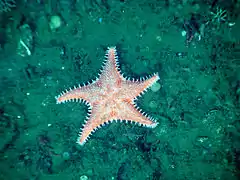Hippasteria
Hippasteria is one of 70 genera of sea star in the diverse family Goniasteridae.[1]
| Hippasteria | |
|---|---|
 | |
| Hippasteria phrygiana | |
| Scientific classification | |
| Kingdom: | |
| Phylum: | |
| Class: | |
| Order: | |
| Family: | |
| Subfamily: | Hippasterinae |
| Genus: | Hippasteria Gray, 1840[1] |
| Synonyms | |
|
Hippasteria (Euhippasteria) Dons, 1938 | |
Description and characteristics
These sea stars are regular, five-armed starfishes, with a large and flattened central disc. Most of the species in this genus live in deep seas, where they seem to be predators of deep sea coral and cnidarians.[2]
The species Hippasteria phrygiana may be one of the most widely distributed species : it is present in the 3 main oceanic basins.[3]
List of species
According to the World Register of Marine Species (WoRMS), the genus Hippasteria is composed of the following twelve species:[1]
- Hippasteria californica Fisher, 1905
- Hippasteria falklandica Fisher, 1940
- Hippasteria heathi Fisher, 1905
- Hippasteria imperialis Goto, 1914
- Hippasteria leiopelta Fisher, 1910
- Hippasteria lepidonotus (Fisher, 1905)
- Hippasteria magellanica Perrier, 1888
- Hippasteria mcknighti Mah, Neill, Eleaume & Foltz 2014
- Hippasteria muscipula Mah, Neill, Eleaume & Foltz 2014
- Hippasteria nozawai Goto, 1914
- Hippasteria phrygiana (Parelius, 1768)
- Hippasteria tiburoni Mah, Neill, Eleaume & Foltz 2014
 Hippasteria imperialis
Hippasteria imperialis Hippasteria mcknighti
Hippasteria mcknighti
 Hippasteria phrygiana attacked by Solaster dawsoni
Hippasteria phrygiana attacked by Solaster dawsoni Hippasteria tiburoni
Hippasteria tiburoni
Bibliography
- Mah, Christopher L.; Neill, K.; Eléaume, Marc; Foltz, D. (2014). "New Species and global revision of Hippasteria (Hippasterinae: Goniasteridae; Asteroidea; Echinodermata)". Zoological Journal of the Linnean Society. 171 (2): 422–456. doi:10.1111/zoj.12131.
References
- Mah, Christopher L. "WoRMS - World Register of Marine Species - Hippasteria Gray, 1840". Marinespecies.org. Retrieved 2014-06-10.
- Mah, Christopher L. (2014-06-10). "The Hippest Post you Know! New Hippasteria species!". The Echinoblog.
- Mah, Christopher L. (2013-02-12). "Starfish Mystery! 3 Oceans,2 Hemispheres,but ONE species?!". The Echinoblog.
This article is issued from Wikipedia. The text is licensed under Creative Commons - Attribution - Sharealike. Additional terms may apply for the media files.